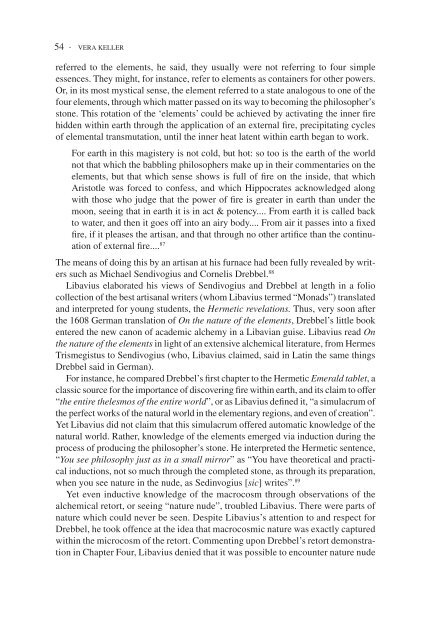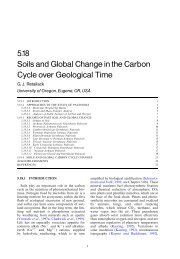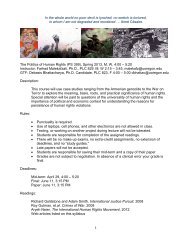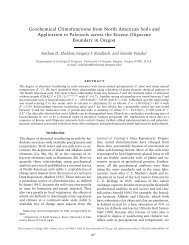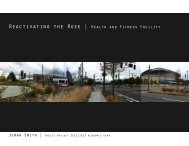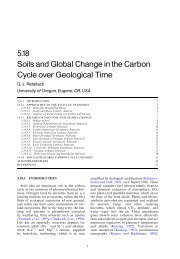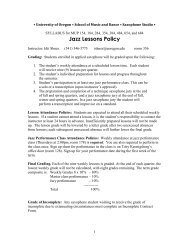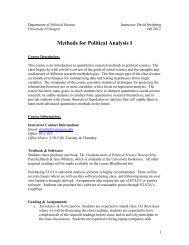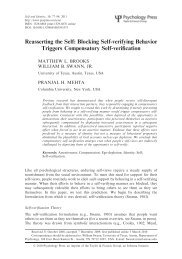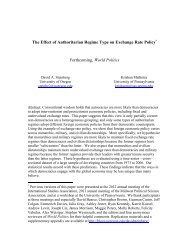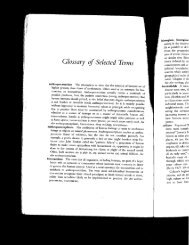drebbel's living instruments, hartmann's microcosm, and libavius's ...
drebbel's living instruments, hartmann's microcosm, and libavius's ...
drebbel's living instruments, hartmann's microcosm, and libavius's ...
Create successful ePaper yourself
Turn your PDF publications into a flip-book with our unique Google optimized e-Paper software.
54 · VERA KELLERreferred to the elements, he said, they usually were not referring to four simpleessences. They might, for instance, refer to elements as containers for other powers.Or, in its most mystical sense, the element referred to a state analogous to one of thefour elements, through which matter passed on its way to becoming the philosopher’sstone. This rotation of the ‘elements’ could be achieved by activating the inner firehidden within earth through the application of an external fire, precipitating cyclesof elemental transmutation, until the inner heat latent within earth began to work.For earth in this magistery is not cold, but hot: so too is the earth of the worldnot that which the babbling philosophers make up in their commentaries on theelements, but that which sense shows is full of fire on the inside, that whichAristotle was forced to confess, <strong>and</strong> which Hippocrates acknowledged alongwith those who judge that the power of fire is greater in earth than under themoon, seeing that in earth it is in act & potency.... From earth it is called backto water, <strong>and</strong> then it goes off into an airy body.... From air it passes into a fixedfire, if it pleases the artisan, <strong>and</strong> that through no other artifice than the continuationof external fire.... 87The means of doing this by an artisan at his furnace had been fully revealed by writerssuch as Michael Sendivogius <strong>and</strong> Cornelis Drebbel. 88Libavius elaborated his views of Sendivogius <strong>and</strong> Drebbel at length in a foliocollection of the best artisanal writers (whom Libavius termed “Monads”) translated<strong>and</strong> interpreted for young students, the Hermetic revelations. Thus, very soon afterthe 1608 German translation of On the nature of the elements, Drebbel’s little bookentered the new canon of academic alchemy in a Libavian guise. Libavius read Onthe nature of the elements in light of an extensive alchemical literature, from HermesTrismegistus to Sendivogius (who, Libavius claimed, said in Latin the same thingsDrebbel said in German).For instance, he compared Drebbel’s first chapter to the Hermetic Emerald tablet, aclassic source for the importance of discovering fire within earth, <strong>and</strong> its claim to offer“the entire thelesmos of the entire world”, or as Libavius defined it, “a simulacrum ofthe perfect works of the natural world in the elementary regions, <strong>and</strong> even of creation”.Yet Libavius did not claim that this simulacrum offered automatic knowledge of thenatural world. Rather, knowledge of the elements emerged via induction during theprocess of producing the philosopher’s stone. He interpreted the Hermetic sentence,“You see philosophy just as in a small mirror” as “You have theoretical <strong>and</strong> practicalinductions, not so much through the completed stone, as through its preparation,when you see nature in the nude, as Sedinvogius [sic] writes”. 89Yet even inductive knowledge of the macrocosm through observations of thealchemical retort, or seeing “nature nude”, troubled Libavius. There were parts ofnature which could never be seen. Despite Libavius’s attention to <strong>and</strong> respect forDrebbel, he took offence at the idea that macrocosmic nature was exactly capturedwithin the <strong>microcosm</strong> of the retort. Commenting upon Drebbel’s retort demonstrationin Chapter Four, Libavius denied that it was possible to encounter nature nude


